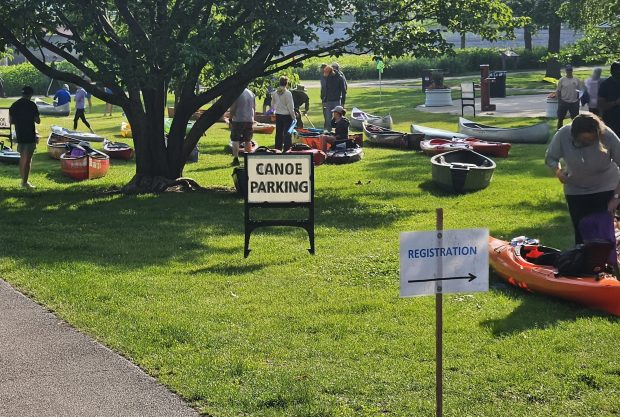With NRG now required under new U.S. Environmental Protection Agency (EPA) rules to mitigate coal ash residue outside two existing ponds, state Rep. Rita Mayfield, D-Gurnee, hopes it will spur the utility to fill both, rather than just one and cap the other.
After NRG proposed to completely remove one pond and cap the adjacent one more than two years ago, Mayfield and state Sen. Adrianne Johnson, D-Buffalo Grove, introduced legislation to require the closure of both.
Quickly passing the state Senate, the bill stalled in the state House of Representatives as Mayfield was unable to rally sufficient support. Her quest began again early last year and is still a few votes shy of the 60 needed for passage. She hopes the EPA rules will help.
The Waukegan Generating Station on Lake Michigan, owned by NRG Energy, is ringed by ash ponds Wednesday, May 12, 2021, in Waukegan, Illinois.(Erin Hooley/Chicago Tribune)
“I hope they’ll include all of it in their cleanup plans, and just get rid of them both,” Mayfield said Friday. “It will give them a leg up with the new rules.”
The EPA issued a new set of rules late last month in Washington, and one governs residue from coal-fired power plants — coal ash — like the facility NRG continues to operate in Waukegan for backup purposes.
Angela Hackel, the EPA’s acting director of the office of media relations and risk communications, said in an email Friday utilities like NRG must determine if they have a situation that can potentially pollute groundwater and develop a plan to remediate it.
Thomas Maillard, the government affairs liaison for the Waukegan mayor’s office, said Monday the grassy area to the west of NRG’s two coal ash ponds is a legacy pond that likely falls under the new rule.
“The area is shown to contaminate groundwater,” Maillard said. “This groundwater can leak into Lake Michigan. NRG’s reports have shown a hypothetical leak would be catastrophic. This is where 6.5 million Illinois residents who live along Lake Michigan get their drinking water.”
Johnson echoed Mayfield’s sentiments, hoping NRG will now remove the two ponds rather than just capping the one. She believes it is time both NRG and more members of the state legislature pay more attention to the situation.
“We have to be accountable to environmental justice communities like Waukegan,” Johnson said. “Legacy ponds like this which are not lined can leach into the groundwater and contaminate it.”
Under the new rules, Hackel said companies like NRG now have a number of regulations they must follow regarding the areas which include groundwater monitoring and corrective action. It could be classified as a hazard. They must warn people.
“The requirements include installation of a permanent marker, recordkeeping for the history of construction, structural stability and factors of safety assessments,” Hackel said in the email.
While NRG determines how it will comply with the new rules, Johnson and Mayfield are working on a legislative remedy which will rid Waukegan of the two ponds. They are a few yards from Lake Michigan.
Hoping to get the necessary votes to move her legislation out of committee onto the House floor for a vote, Mayfield said she is working with advocates to get people to agree to vote for it. NRG continues to lobby against the legislation.
Mayfield said if she can garner the few votes she needs, she is confident it will become law. Johnson is confident the Senate will pass it like it did the first effort two years ago. Mayfield said Gov. J.B. Pritzker will sign it.
Efforts to reach NRG were unsuccessful.





